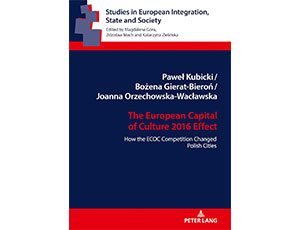
The European Capital of Culture is one of the European Union’s most important cultural programmes, its significance transcending a narrow understanding of the cultural sphere. The scheme has been one of the foremost mechanisms contributing to the urban revival of European cities and increasingly close integration in many areas of social and cultural activity. The ECOC 2016 competition (2007-2011), entered by 11 Polish cities, took place in an exceptionally favourable context.
The ECOC 2016 competition in Poland served as an impetus for many changes to take place in the participant cities. These particularly applied to the sociocultural sphere, encompassing such issues as a city’s identity and social capital. Consequently, it became possible to create new urban narratives which also contributed to changes regarding the cities’ images. In some cases, this could even be described as a real revolution which was able to take place as a result of unprecedented social mobilisation.
Contents
Introduction
1. The ECOC Programme and Urban Renewal
2. Research Premises and Methodology
3. Identity and Urban Narratives
The ECOC competition as a generational experience
Urban narratives
The image of the cities
Social capital
Lublin:
Łódź:
Katowice:
4. Cities’ Cultural Policies in the Light of the ECOC Competition
5. Urban Networks. Coalitions of Cities
6. Infrastructure. New Cultural Institutions
New cultural institutions in Poland in the light of the ECOC 2016 applications
The Katowice Culture Zone. Creativity in a modernist form
Gdańsk institutions: politics and culture
Szczecin and the “best buildings” in Europe and the world
Wrocław’s ‘giant’: the National Forum of Music
7. Europeanness and the Europeanisation of Polish Cities
The Europeanness of Polish cities in the light of the ECOC 2016 competition
8. Summary of Research
9. Appendix
Analysis of the initial programme briefs
1. Gdańsk: “Freedom of Culture. Culture of Freedom”
2. Katowice: “City of Gardens”
3. Lublin: “City in Dialogue”
4. Łódź: “(R)evolution of Imagination”
5. Poznań: “Poznań Cultural Storm”
6. Szczecin: “Power to Join”
7. Wrocław: “Spaces for Beauty”
Cities in a process of change: redefining identity, re-evaluating the function of the city, metamorphosis of the image
1. Gdańsk – an axiological discourse on freedom
2. Katowice: from industrial city to garden city
3. Lublin: generating local culture and aiming eastwards
4. Łódź: revolution versus evolution
5. Poznań: between economics and culture
6. Szczecin: cultural crossing of borders
7. Wrocław: mental metamorphoses
Adaptation of European ideas (selected examples)
1. The “European dimension” criterion
2. The “City and residents” criterion
Innovativeness of the project (best examples)
Predicted short- and long-term consequences of implementation of the ECOC 2016 projects
Bibliography
Series index

